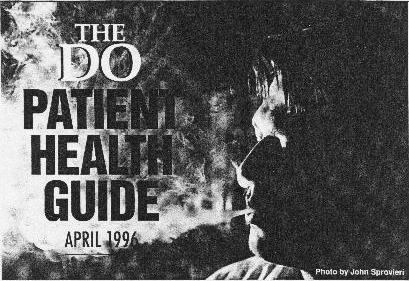 Tobacco smoke is hazardous for nonsmokers too
Tobacco smoke is hazardous for nonsmokers tooA person you live with or a person you work with smokes cigarettes. The smoke gets in your eyes, your hair, your clothes and, more importantly, your lungs. Because of your regular exposure to secondhand tobacco smoke, your eyes may be red, itchy and watery; you may cough a great deal, and you may cough up phlegm; you may experience chest discomfort; and your lung function may decrease.
Secondhand smoke exposes you to the same cancer-causing substances and other dangerous chemicals that smokers breathe. Every year in the United States, an estimated 3,000 nonsmokers die from lung cancer caused by exposure to secondhand tobacco smoke. In addition, research indicates that passive smoking causes 30,000 to 60,000 fatal heart attacks and three times as many nonfatal cardiovascular events each year.
If you are a nonsmoker who is exposed to secondhand smoke, your heart is probably more susceptible to heart damage caused by tobacco smoke than is the heart of the smoker with whom you share space. A research team from the Cardiovascular Research Institute at the University of California, San Francisco, School of Medicine found that the cardiovascular system of a smoker compensates for the ill effects of smoking but that the cardiovascular system of a nonsmoker does not adapt in the same way.
Researchers also are discovering that your risk varies depending on where you are exposed to smoke.
A study published in the June 8, 1994, issue of The Journal of the American Medical Association (JAMA) found that nonsmoking women who are exposed to secondhand smoke at home are 24% more likely to develop lung cancer than are women who are not exposed to tobacco smoke. Nonsmoking women who are exposed to secondhand smoke at work are 39% more likely to develop lung cancer than are women who are not exposed to smoke, according to the JAMA study. And nonsmoking women who are exposed regularly to secondhand smoke in social settings, such as bars, are 50% more likely to develop lung cancer than are nonsmoking women who do not frequent such settings.
Workplace tobacco smoke is at least partly responsible for a 50% higher risk of lung cancer among bar and restaurant employees compared with the general population, according to a study published in the July 28, 1993, issue of JAMA.
In addition, researchers have found that nonsmokers who work with substances that can cause lung disease have an even greater risk of developing lung cancer if they are exposed to secondhand smoke at work.
Infants and other children are extremely susceptible to the ill effects of secondhand smoke. The US Environmental Protection Agency estimates that every year between 150,000 and 300,000 children younger than 18 months develop bronchitis or pneumonia from breathing secondhand smoke. Exposure to secondhand smoke also increases children's chances of developing asthma.
Researchers have linked exposure to secondhand smoke to an increase in the number and severity of asthma attacks experienced by children who suffer from asthma. The American Academy of Otolaryngology-Head and Neck Surgery says that secondhand smoke can aggravate sinusitis, rhinitis and cystic fibrosis among children, as well as increase the number and duration of ear infections and the number of colds and sore throats experienced by children.
The American Academy of Pediatrics says that when a pregnant woman smokes, she increases her chances of having a miscarriage, of giving birth prematurely, and of having a low-birthweight baby. She also increases her baby's chances of becoming a victim of sudden infant death syndrome.
For more information on passive smoking, smoking in the workplace, and quitting smoking, call the American Lung Association at (800) 586-4872.
For more information about the effects of secondhand smoke on children, send a self-addressed, stamped, business-sized envelope to "Environmental Tobacco Smoke," Department C, American Academy of Pediatrics, 141 Northwest Point Blvd, PO Box 927, Elk Grove Village, IL 60009-0927. Or send a self-addressed, stamped, business-sized envelope to "Secondhand," American Academy of Otolaryngology--Head and Neck Surgery, 1 Prince St, Alexandria, VA 22314. The academy's information is available in both English and Spanish.
This article was copied from the April, 1996, issue of the medical journal The D.O. www.DoctorPaddock.com